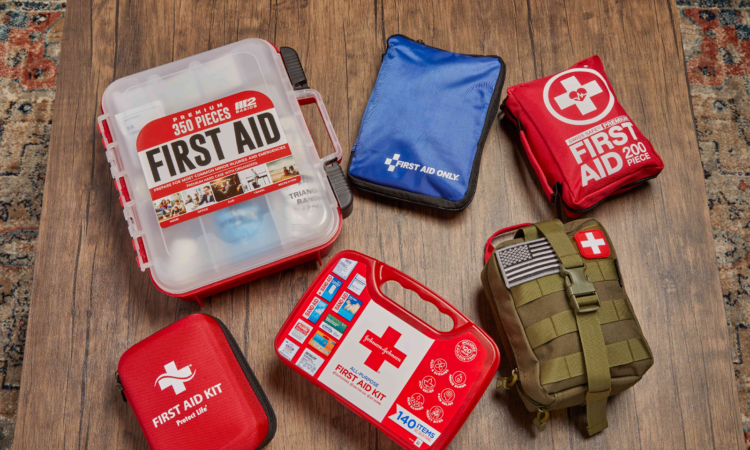
A well-prepared first-aid, IFAK kit is essential for handling common injuries and emergencies. It’s recommended to keep at least one kit in your home and one in your vehicle. Store your kits in easily accessible locations, but out of reach of young children. Ensure that children who are old enough to understand the purpose of the kit know where to find it.
You can either purchase a pre-made first-aid kit or assemble one yourself. Tailor your kit to suit your specific needs and activities. A basic first-aid kit should include:
Basic Supplies
- Adhesive tape
- Elastic bandages
- Bandage strips and butterfly bandages in various sizes
- Super glue
- Rubber tourniquet
- 14 French catheter
- Nonstick sterile bandages and roller gauze in different sizes
- Eye shield or pad
- Large triangular bandage for use as a sling
- Aluminum finger splint
- Instant cold packs
- Cotton balls and cotton-tipped swabs
- Disposable non-latex examination gloves (several pairs)
- Duct tape
- Petroleum jelly or lubricant
- Assorted plastic bags
- Safety pins in various sizes
- Scissors and tweezers
- Hand sanitizer
- Antibiotic ointment
- Antiseptic solution and towelettes
- Eyewash solution
- Thermometer
- Bulb syringe (turkey baster) for flushing wounds
- Sterile saline for irrigation
- Breathing barrier or surgical mask
- Syringe, medicine cup, or spoon
- First-aid manual
- Hydrogen peroxide for disinfecting
Medications
- Aloe vera gel
- Calamine lotion
- Anti-diarrhea medication
- Laxatives
- Antacids
- Antihistamines (e.g., diphenhydramine)
- Hydrocortisone cream
- Cough and cold medications
- Personal medications that do not require refrigeration
- Auto-injector of epinephrine (if prescribed by a doctor)
- Pain relievers (acetaminophen, ibuprofen)
- Consider keeping aspirin in your kit, as it can be life-saving during chest pain in adults. If you or someone else has unexplained chest pain or suspects a heart attack, call for emergency help immediately and chew a regular-strength aspirin. However, avoid giving aspirin if you have allergies to it, bleeding disorders, or take blood-thinning medications.
Emergency Items
- Emergency contact numbers (including family doctor, local emergency services, poison control, etc.)
- Medical consent forms for each family member
- Medical history forms for each family member
- Health insurance information
- Small waterproof flashlight or headlamp with extra batteries
- Waterproof matches
- Notepad and waterproof pen
- Emergency space blanket
- Cellphone with solar charger
- Sunscreen and insect repellent
Kit Maintenance
Regularly inspect your first-aid kits to ensure the flashlight works, and replace expired or used items. Mark the date of the last kit check to track its usage.
Consider taking a first-aid course with the American Red Cross to ensure you know how to respond in an emergency. The organization offers helpful resources, including child-friendly courses to teach first-aid techniques.



